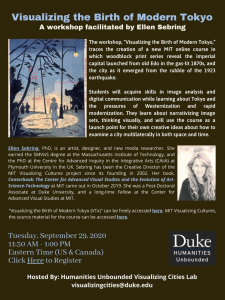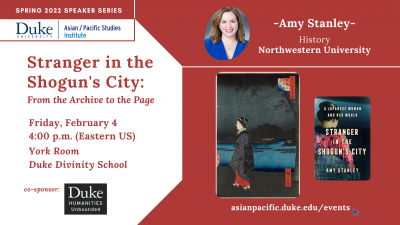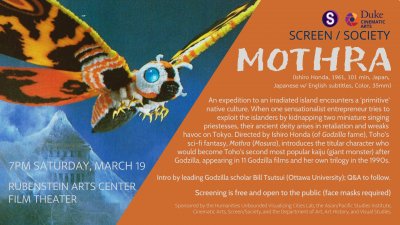Type: Lab
Visualizing the Birth of Modern Tokyo with Ellen Sebring
September 29, 2020
The workshop, “Visualizing the Birth of Modern Tokyo,” traces the creation of a new MIT online course in which woodblock print series reveals the imperial capital launched from old Edo in the gas-lit 1870s and the city as it emerged from the rubble of the 1923 earthquake. Students will acquire skills in image analysis and digital communication while learning about Tokyo and the pressures of Westernization and rapid modernization. They learn about narrativizing image sets, thinking visually, and will use the course as a launch point for their own creative ideas about how to examine a city multilaterally in both space and time. Ellen Sebring created the online course-Visualizing the Birth of Modern Tokyo (VTx)-with scholars including eminent historian John W. Dower from MIT Visualizing Cultures and the Smithsonian Institution. The course, VTx, can be freely accessed at https://www.edx.org/course/visualizing-the-birth-of-modern-tokyo MIT Visualizing Cultures, the source material for the course: visualizingcultures.mit.edu
Stranger in the Shogun's City: From the Archive to the Page
February 4, 2022
The Visualizing Cities Lab and the Asian/Pacific Studies Institute invited Amy Stanleyto speak on how she used archives to write Stranger in the Shogun’s City: A Japanese Woman and Her World, a finalist for the Pulitzer Prize in Biography, winner of the 2020 National Book Critics Circle Award, and winner of the PEN/Jacqueline Bograd Weld Award for Biography.
In the early nineteenth century, an irrepressible woman named Tsuneno ran away from home. Defying convention, she made a life for herself in the big city of Edo (now Tokyo) in the decades before the arrival of Commodore Perry and the fall of the shogunate. But as she was an unknown person, finding out what happened to her is a difficult task. This talk focuses on how images and documents in the Japanese archive can be used - carefully - to tell her story.
About the speaker
Amy Stanley is the Wayne V. Jones Research Professor of History at Northwestern University. Primarily a social historian of early modern and modern Japan, she has special interests in global history, women's and gender history, and narrative. She is the author of Selling Women: Prostitution, Markets, and the Household in Early Modern Japan (UC Press 2012), as well as articles in the American Historical Review, The Journal of Japanese Studies, and The Journal of Asian Studies. Her most recent book, Stranger in the Shogun's City: A Japanese Woman and Her World (Scribner, 2020), won the National Book Critics' Circle Award in Biography and PEN/America Jacqueline Bograd Weld Award in Biography and was a finalist for the Pulitzer Prize. She received her PhD in East Asian Languages and Civilizations from Harvard in 2007, and she has held fellowships from the Japan Foundation, the Japan-U.S. Friendship Commission, and the National Endowment for the Humanities.
Mothra
March 19, 2022
The Visualizing Cities Lab hosted leading Godzilla scholar Bill Tsutsui (Ottawa University) for a screening of Mothra. Tsutsui presented an introduction to the film and led a Q&A at its conclusion.
An expedition to an irradiated island encounters a 'primitive' native culture. When one sensationalist entrepreneur tries to exploit the islanders by kidnapping two miniature singing priestesses, their ancient deity arises in retaliation and wreaks havoc on Tokyo.
Directed by Ishiro Honda (of Godzilla fame), Toho’s sci-fi fantasy, Mothra (Mosura), introduces the titular character who would become Toho's second most popular kaiju (giant monster) after Godzilla, appearing in 11 Godzilla films and her own trilogy in the 1990s.
(Ishiro Honda, 1961, 101 min, Japan, Japanese w/ English subtitles, Color, 35mm)


